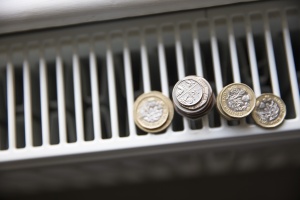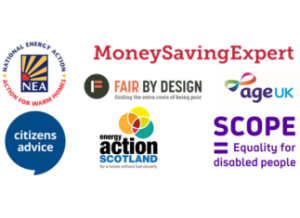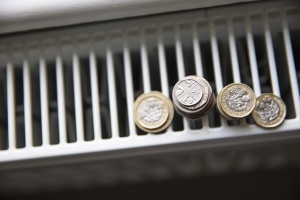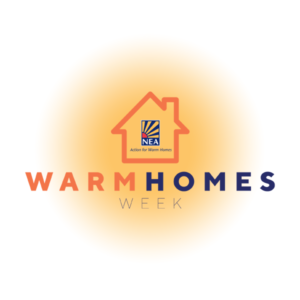Contact: Pat Austin, Director of NEA NI | Tel: 077 0321 0390 | Email: pat.austin@nea.org.uk Jamie Miller, Policy Officer | Tel: 0759 1596145 | Email: Jamie.miller@nea.org.uk
The ‘perfect storm’ of higher energy prices, reduced incomes, and leaky, inefficient housing could put many households in Northern Ireland at increased risk of fuel poverty this coming winter. As wholesale energy prices continue to rise there is a risk that consumers in Northern Ireland will face further price hikes in the coming months. These increases come at a time when many household budgets are already stretched thin.
With that in mind, Fuel Poverty Charity National Energy Action (NEA), have listed five top tips that you can spend your High Street scheme ‘Spend Local’ card on to help reduce your heating and energy bills.
#1 — Draught Proof your home
Did you know the average home wastes around £25 per year due the draughts alone!
Thankfully there are a number of low-cost measures you can carry out to reduce draughts in your home and save money.
Doors
Pick up some fabric draught excluders for your doors. These can be purchased from between £7.50 – £10. If you are feeling creative, you can even have a go at making your own. All you need is a large pair of woolly socks stuffed with popcorn kernals and pillow stuffing and then tied at each end.

You can also get some door brushes and or foam strips around edges. These can be bought for around £5 per door.
Did you know keyhole covers can help reduce drafts? These can be purchased for as little as £3 each.
You would be surprised how much of a draft you can get through your letterbox. Investing in a letterbox flap or brush (approximately £5) could help reduce this.
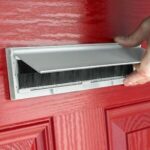
Windows
Window frames can be a common source of drafts. You can buy draught-proofing strips to stick around the window frame and fill in the gaps. These are available for around £5.
Chimney
If you don’t use your fireplace, you could be wasting approx. £18 per year from heat escaping through your chimney! Investing in a Chimney Balloon for as little as £15-£20 could help you save money year on year.
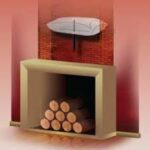
#2 — Invest in Energy Efficient Lighting
Lighting and appliances make up around 15% of all energy use in your home. Investing in energy efficient lighting can be a very easy way to reduce your energy bills.
Switching from halogen bulbs to more energy efficiency LEDs could help save between £2 – £3 per bulb per year. Just think how quickly that can add up throughout your home. You can get a 4 pack of bulbs for as little as £3.99.
Making sure to turn off lights you don’t need could save around £17 per year.
#3 — Improve you Heating Controls
It’s estimated that switching up your heating controls to a modern device could help you save as much as 20% off your heating bills, so it’s easy to see how it can pay for itself before long. There are a few different options you can consider to help make sure you aren’t using energy when you don’t need it.
You can buy timer switches (£5) for your electrical appliances. These allow you to set when your lights, phone chargers, tv or other electrical appliances switch on and off.

If you don’t already have Thermostatic Radiator Valves on your radiators these can be purchased for around £9.99 and are a great way to reduce wasted heat. TRVs help to control the air temperature of a space by automatically adjusting the amount of hot water that enters the radiator.
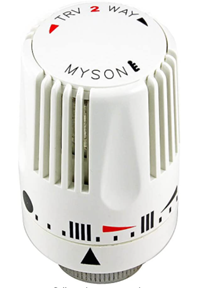
#4 — Consider investing in a slow cooker
According to the Energy Saving Trust, cooking accounts for 13.8% of electricity used in UK homes, while freezing and cooling food consumes another 16.8%. Combined, that’s over 30% of your total household energy use coming from these two activities alone. An average-sized slow cooker will use about 1.3 kWh of electricity per meal cooked, which breaks down to less than 1p per hour at an average energy tariff. Additional benefits of using a slow cooker include:
- A smaller amount of heat is applied over a longer period.
- You can leave your food to cook while you’re at work, saving prep time in the evenings.
- There are fewer dishes to wash up, as slow cookers are one-pot meals. This helps save water and heat.
- You can make extra servings of your meals to freeze or refrigerate for later, saving energy over time.
- Some models include a timer to automatically stop cooking at a set time to avoid overcooking and using unnecessary energy.
#5 — Use your voucher to top up your prepayment meter
If you have a prepayment meter for your gas or electricity you can use your high street voucher to top up your meter at a local pay point terminal, providing the vendor has a chip and pin machine.
As wholesale fuel prices continue to rise internationally there is a significant risk that energy prices in Northern Ireland will be increased again in the coming months. You can use your high street voucher to make sure you have credit on your meter for the coming winter.
There are a number of other low costs measures that can help you save money on your energy bills. You can contact NI Energy Advice who offer free independent and impartial energy advice, including advice about energy grants &schemes and other sources of help.
Visit: https://nihe.gov.uk/Community/NI-Energy-Advice.
#6 — If you are eligible for a Spend Local prepaid Card, but feel as though you don’t need it, please consider a donation in kind to help those struggling to stay warm this winter.
We know that around one in five households in Northern Ireland struggle with Fuel Poverty. NEA are concerned that the ‘perfect storm’ of higher energy prices, reduced incomes, and leaky, inefficient housing could put many households in Northern Ireland at increased risk of fuel poverty this coming winter. As wholesale energy prices continue to rise there is a risk that consumers in Northern Ireland will face further price hikes in the coming months. These increases come at a time when many household budgets are already stretched thin. The winding down of the furlough scheme and the withdrawal of uplifts to Universal Credit will put further stress on many families in Northern Ireland.
NEA need your support to help mitigate the worst impacts of the coming winter.
By donating the equivalent of your Spend Local Card to NEA, we can:
- Provide life-changing energy efficiency advice;
- Help to provide essential winter items to those in need through a hardship fund;
- Offer assistance to those struggling with fuel debt;
- Make vital referrals to help vulnerable customers access extra support; and
- Provide benefits advice and supporting people with applications.
To make a donation we simply ask that you use your voucher to cover some of your regular monthly expenditure, such as a weekly food shop, and then donate the equivalent savings to NEA by visiting: https://www.nea.org.uk/support-us/donate-your-ni-voucher-scheme/.
With your support NEA can provide a lifeline to those in need this winter.
[Ends]
Notes to editors
National Energy Action (NEA) is the national fuel poverty charity working to secure affordable warmth for disadvantaged energy consumers. NEA’s strategic aims include influencing and increasing strategic action against fuel poverty; developing and progressing solutions to improve access to energy efficiency products, advice and fuel poverty related services in UK households and enhancing knowledge and understanding of energy efficiency and fuel poverty.
NEA is primarily concerned with energy policy whilst maintaining a watching brief on social justice policies including income inequalities and levels of poverty in Northern Ireland.
Protecting vulnerable customers is our key aim so we work both reactively and proactively to ensure policy makers and regulators recognise the needs of the vulnerable in its widest sense. With tighter household budgets it is more important than ever that consumers are getting the best deal.
The Cold Hard Facts
Every winter thousands of people are faced with living in properties which are dangerous or unfit for colder seasons. 22% of households in Northern Ireland still live in fuel poverty, meaning they live below the poverty line but also have much higher bills due to poor levels of energy efficiency.
Independent analysis suggests that, during winter months, families in cold, leaky homes are facing heating bills on average of £124 per month, compared with £76 per month for those in well-insulated homes (a £50 per month difference).
Around 68% of households in Northern Ireland are reliant on Home Heating Oil to heat their homes; an unregulated fuel in terms of price and consumer protection.
The 2019- 2020 UK Fuel Poverty Monitor, found that COVID-19 had created difficult conditions for fuel poor households, driven by an increase in energy use, due to more people spending more time at home, and a reduction in income, as many jobs were either lost or placed on furlough.
Contact:
Pat Austin, Director of NEA NI | Tel: 077 0321 0390 | Email: pat.austin@nea.org.uk
Jamie Miller, Policy Officer | Tel: 0759 1596145 | Email: Jamie.miller@nea.org.uk



